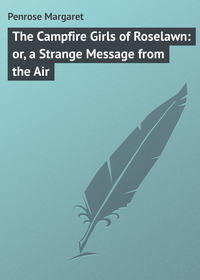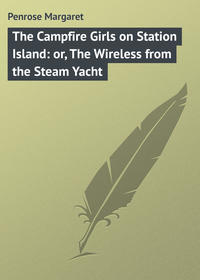 полная версия
полная версияDorothy Dale in the City
“Why didn’t you say so?” Dorothy asked.
It seemed for the moment that the girls and boys were not to get along in their usual pleasant manner. But the wonderful sleighing, and the delightful afternoon, soon obliterated the threatening difficulties, and a happy, laughing party in each cutter glided over the road, now evenly packed with mid-winter snow.
The small boys along the way occasionally stole a ride on the back runners of the sleighs, or “got a hitch” with sled or bob, thus saving the walk up hill or the jaunt to the ice pond.
“Oh, there’s Dr. Gray!” Dorothy exclaimed suddenly as a gentleman in fur coat and cap was seen hurrying along. “I wonder why he is walking?”
“For his health, likely,” Ted answered. “Doctors know the sort of medicine to take for their own constitutions.”
By this time they were abreast of the physician. Dorothy called out to him:
“Where’s your horse, Doctor?”
“Laid up,” replied the medical man, with a polite greeting. “He slipped yesterday – ”
“Going far?” Ted interrupted, drawing his horse up.
“Out to Sanders’s,” replied the doctor.
“Sanders’s!” repeated Dorothy. “That’s where we’re going. Who’s sick?”
“The baby,” replied the doctor, “and they asked me to hurry.”
“Get in with us,” Ted invited, while Dorothy almost gasped. Little Emily sick! She could scarcely believe it.
Dr. Gray gladly accepted the invitation to ride, and the next cutter with Ned, Nat and Mabel, pulled up along side of Ted’s.
“You may as well turn back,” Dorothy told them. Then she explained that little Emily was sick, and likely would not want her Christmas tree trimmed.
“But I’ll go along,” she said, “I may be able to help, for her mother is sick, even if she is with her.”
After all her preparations, it was a great disappointment to think the child could not enjoy the gifts. Dr. Gray told her, however, that Emily was subject to croup, and that perhaps the spell would not last.
At the house they found everything in confusion. Emily’s sick mother coughed harder at every attempt she made to help the little one, while Mr. Sanders, the child’s grandfather, tried vainly to get water hot on a lukewarm stove.
“Pretty bad, Doc,” he said with a groan, “thought she’d choke to death last night.”
Without waiting to be directed, Dorothy threw aside her heavy coat, drew off her gloves, and was breaking bits of wood in her hands, to hurry the kettle that, being watched, had absolutely refused to boil.
“You can just put that oil on to heat, Miss Dale,” Dr. Gray said, he having bidden the sick woman to keep away from Emily. “We’ll rub her up well with warm oil, and see if we can loosen up that congestion.”
Emily lay on the uneven sofa, her cheeks burning, and her breath jerking in struggles and coughs.
Dorothy found a pan and had the oil hot before the doctor was ready to use it.
“Quite a nurse,” he said, in that pleasant way the country doctor is accustomed to use. “Glad I happened to meet you.”
“I’m glad, too,” Dorothy replied sincerely. “Never mind, Emily, you will have your Christmas tree, as soon as we get the naughty cold cured,” she told the child.
Emily’s eyes brightened a little. The tree still stood in a corner of the room. Outside, Ted was driving up and down the road in evident impatience, but Dorothy was too busy to notice him.
Soon the hot applications took effect, and Emily breathed more freely and regularly. Then the doctor attended to the other patient – the mother. It was a sad Christmas time, and had a depressing effect even on the young spirits of Dorothy. She tried to speak to Emily, but her eyes wandered around at the almost bare room, and noted its untidy appearance. Dishes were piled up on the table, pans stood upon the floor, papers were littered about. How could people live that way? she wondered.
Mrs. Tripp, Emily’s mother, must be a widow, Dorothy thought, and she knew old Mrs. Sanders had died the Winter before.
The doctor had finished with Mrs. Tripp. He glanced anxiously about him. To whom would he give instructions? Mr. Sanders seemed scarcely capable of giving the sick ones the proper care.
Dorothy saw the look of concern on the doctor’s face and she rightly interpreted it.
“If we only could take them to some other place,” she whispered to him. Then she stopped, as a sudden thought seized her.
“Doesn’t Mr. Wolters always make a Christmas gift to the sanitarium?” she asked Dr. Gray.
“Always,” replied the doctor.
“Then why can’t we ask him to have little Emily and her mother taken to the sanitarium? They surely need just such care,” she said quickly.
The doctor slapped one hand on the other, showing that the suggestion had solved the problem. Then he motioned Dorothy out into the room across the small hall. She shivered as she entered it, for it was without stove, or other means of heating.
“If I only had my horse,” he said, “I would go right over to Wolters’s. He would do a great deal for me, and I want that child cared for to-night.”
“I’ll ask Ted to let us take his sleigh,” Dorothy offered, promptly. “He could go with us to the Corners, and then you could drive.”
“And take you?” asked Dr. Gray. “I am sure you young folks have a lot to do this afternoon.”
“No matter about that,” persisted Dorothy. “If I can help, I am only too glad to do it. And Mr. Wolters is on Aunt Winnie’s executive board. He might listen to my appeal.”
There was neither time nor opportunity for further conversation, so Dorothy hastily got into her things, and soon she was in Ted’s sleigh again, huddled close to Dr. Gray in his big, fur coat.
The plan was unfolded to Ted, and he, anxious to get back to his friends, willingly agreed to walk from the Corners, and there turn the cutter over to the charity workers.
“But Dorothy,” he objected, “I know they will all claim I should have insisted on your coming back with me. They will say you will kill yourself with charity, and all that sort of thing.”
“Then say I will be home within an hour,” Dorothy directed, as Ted jumped on the bob that a number of boys were dragging up the hill. “Good-bye, and thank you for the rig.”
“One hour, mind,” Ted called back. “You can drive Bess, I know.”
“Of course,” Dorothy shouted. Then Bess was headed for The Briars, the country home of the millionaire Wolters.
“Suppose he has already made his gift,” Dorothy demurred, as she wrapped the fur robe closely about her feet, “and says he can’t guarantee any more.”
“Then I guess he will have to make another,” said the doctor. “I would not be responsible for the life of that child out there in that shack.”
“If he agrees, how will you get Mrs. Tripp and Emily out to the sanitarium?” Dorothy asked.
“Have to ’phone to Lakeside, and see if we can get the ambulance,” he replied. “That’s the only way to move them safely.”
It seemed to Dorothy that her plan was more complicated than she had imagined it would be, but it was Christmas time, and doing good for others was in the very atmosphere.
“It will be a new kind of Christmas tree,” observed the doctor. “But she’s a cunning little one – she deserves to be kept alive.”
“Indeed she does,” Dorothy said, “and I’m glad if I can help any.”
“Why I never would have thought of the plan,” said the doctor. “I had been thinking all the time we ought to do something, but Wolters’s Christmas gift never crossed my mind. Here we are. My, but this is a great place!” he finished. And the next moment Dorothy had jumped out of the cutter and was at the door of Mr. Ferdinand Wolters.
CHAPTER VI
THE NIGHT BEFORE CHRISTMAS
Dorothy was scolded. There her own family – father, Joe and Roger, to say nothing of dear Aunt Winnie, and the cousins Ned and Nat – were waiting for her important advice about a lot of Christmas things, and she had ridden off with Dr. Gray, attending to the gloomy task of having a sick child and her mother placed in a sanitarium.
But she succeeded, and when on the following day she visited Emily and her mother, she found the nurses busy in an outer hall, fixing up the Christmas tree that Mr. Sanders had insisted upon bringing all the way from the farmhouse where Dorothy had left it for little Emily.
The very gifts that Dorothy left unopened out there, when she found the child sick, the nurses were placing on the tree, waiting to surprise Emily when she would open her eyes on the real Christmas day.
And there had been added to these a big surprise indeed, for Mr. Wolters was so pleased with the result of his charity, that he added to the hospital donation a personal check for Mrs. Tripp and her daughter. The check was placed in a tiny feed bag, from which a miniature horse (Emily’s pet variety of toy) was to eat his breakfast on Christmas morning.
Major Dale did not often interfere with his daughter’s affairs, but this time his sister, Mrs. White, had importuned him, declaring that Dorothy would take up charity work altogether if they did not insist upon her taking her proper position in the social world. It must be admitted that the kind old major believed that more pleasure could be gotten out of Dorothy’s choice than that of his well-meaning, and fashionable, sister. But Winnie, he reflected, had been a mother to Dorothy for a number of years, and women, after all, knew best about such things.
It was only when Dorothy found the major alone in his little den off his sleeping rooms that the loving daughter stole up to the footstool, and, in her own childish way, told him all about it. He listened with pardonable pride, and then told Dorothy that too much charity is bad for the health of growing girls. The reprimand was so absurd that Dorothy hugged his neck until he reminded her that even the breath of a war veteran has its limitations.
So Emily was left to her surprises, and now, on the afternoon of the night before Christmas, we find Dorothy and Mabel, with Ned, Nat and Ted, busy with the decorations of the Cedars. Step ladders knocked each other down, as the enthusiastic boys tried to shift more than one to exactly the same spot in the long library. Kitchen chairs toppled over just as Dorothy or Mabel jumped to save their slippered feet, and the long strings of evergreens, with which all hands were struggling, made the room a thing of terror for Mrs. White and Major Dale.
The scheme was to run the greens in a perfect network across the beamed ceiling, not in the usual “chandelier-corner” fashion, but latticed after the style of the Spanish serenade legend.
At intervals little red paper bells dangled, and a prettier idea for decoration could scarcely be conceived. To say that Dorothy had invented it would not do justice to Mabel, but however that may be, all credit, except stepladder episodes, was accorded the girls.
“Let me hang the big bell,” begged Ted, “if there is one thing I have longed for all my life it was that – to hang a big ‘belle’.”
He aimed his stepladder for the middle of the room, but Nat held the bell.
“She’s my belle,” insisted Nat, “and she’s not going to be hanged – she’ll be hung first,” and he caressed the paper ornament.
“If you boys do not hurry we will never get done,” Dorothy reminded them. “It’s almost dark now.”
“Almost, but not quite,” teased Ted. “Dorothy, between this and dark, there are more things to happen than would fill a hundred stockings. By the way, where do we hang the hose?”
“We don’t,” she replied. “Stockings are picturesque in a kitchen, but absurd in such a bower as this.”
“Right, Coz,” agreed Ned, deliberately sitting down with a wreath of greens about his neck. “Cut out the laundry, ma would not pay my little red chop-suey menu last week, and I may have to wear a kerchief on Yule day.”
“Oh, don’t you think that – sweet!” exulted Mabel, making a true lover’s knot of the end of her long rope of green that Nat had succeeded in intertwining with Dorothy’s ‘cross town line’.
“Delicious,” declared Ned, jumping up and placing his arms about her neck.
“Stop,” she cried. “I meant the bow.”
“Who’s running this show, any way?” asked Ted. “Do you see the time, Frats?”
The mantle clock chimed six. Ned and Nat jumped up, and shook themselves loose from the stickery holly leaves as if they had been so many feathers.
“We must eat,” declared Ned, dramatically, “for to-morrow we die!”
“We cannot have tea until everything is finished,” Dorothy objected. “Do you think we girls can clean up this room?”
“Call the maids in,” Ned advised, foolishly, for the housemaids at the Cedars were not expected to clean up after the “festooners.”
Dorothy frowned her reply, and continued to gather up the ends of everything. Mabel did not desert either, but before the girls realized it, the boys had run off – to the dining room where a hasty meal, none the less enjoyable, was ready to be eaten.
“What do you suppose they are up to?” Mabel asked.
“There is something going on when they are in such a hurry. What do you say if we follow them? It is not dark, and they can’t be going far,” answered Dorothy.
Mabel gladly agreed, and, a half hour later, the two girls cautiously made their way along the white road, almost in the shadow of three jolly youths. Occasionally they could hear the remarks that the boys made.
“They are going to the wedding!” Dorothy exclaimed. “The seven o’clock wedding at Winter’s!”
Mabel did not reply. The boys had turned around, and she clutched Dorothy’s arm nervously. Instinctively both girls slowed their pace.
“They did not see us,” Dorothy whispered, presently. “But they are turning into Sodden’s!”
Sodden’s was the home of one of the boys’ chums – Gus Sodden by name. He was younger than the others, and had the reputation of being the most reckless chap in North Birchland.
“But,” mused Mabel, “the wedding is to be at the haunted house! I should be afraid – ”
“Mabel!” Dorothy exclaimed, “you do not mean to say that you believe in ghosts!”
“Oh – no,” breathed Mabel, “but you know the idea is so creepy.”
“That is why,” Dorothy said with a light laugh, “we have to creep along now. Look at Ned. He must feel our presence near.”
The boys now were well along the path to the Sodden home. It was situated far down in a grove, to which led a path through the hemlock trees. These trees were heavy with the snow that they seemed to love, for other sorts of foliage had days before shed the fall that had so gently stolen upon them – like a caress from a white world of love.
“My, it is dark!” demurred Mabel, again.
“Mabel Blake!” accused Dorothy. “I do believe you are a coward!”
It was lonely along the way. Everyone being busy with Christmas at home, left the roads deserted.
“What do you suppose they are going in there for?” Mabel finally whispered.
“We will have to wait and find out,” replied Dorothy. “When one starts out spying on boys she must be prepared for all sorts of surprises.”
“Oh, there comes Gus! Look!” Mabel pointed to a figure making tracks through the snow along the path.
“And – there are the others. It did not take them long to make up. They are – Christmas – Imps. Such make-ups!” Dorothy finished, as she beheld the boys, in something that might have been taken, or mistaken, for stray circus baggage.
Even in their disguise it was easy to recognize the boys. Ned wore a kimono – bright red. On his head was the tall sort of cap that clowns and the old-fashioned school dunce wore. Nat was “cute” in somebody’s short skirt and a shorter jacket. He wore also a worsted cap that was really, in the dim light, almost becoming. Ted matched up Nat, the inference being that they were to be Christmas attendants on Santa Claus.
The girls stepped safely behind the hedge as the procession passed. The boys seemed too involved in their purpose to talk.
“Now,” said Dorothy, “we may follow. I knew they were up to something big.”
“Aren’t they too funny!” said Mabel, who had almost giggled disastrously as the boys passed. “I thought I would die!”
There was no time to spare now, for the boys were walking very quickly, and it was not so easy for the girls to keep up with them and at the same time to keep away from them.
Straight they went for what was locally called the “haunted” house. This was a fine old mansion, with big rooms and broad chimneys, which had once been the home of a family of wealth. But there had been a sad tragedy there, and after that it had been said that ghosts held sway at the place. It had been deserted for two years, but now, with the former owner dead, a niece of the family, fresh from college, had insisted upon being married there, and the house had been accordingly put into shape for the ceremony.
It was to be a fashionable wedding, at the hour of six, and people had kept the station agent busy all day inquiring how to reach the scene of the wedding.
Lights already burned brightly in the rooms, that could be seen to be decorated in holiday style. People fluttered around and through the long French windows; the young folks, boys and girls, being hidden in different quarters, could alike see something of what was going on in the haunted house.
“They’re coming!” Dorothy heard Nat exclaim, just as he ducked in by the big outside chimney. The broad flue was at the extreme end of the house, forming the southern part of the library, just off the wide hall that ran through the middle of the place. Dorothy and Mabel had taken refuge in one of the many odd corners of the big, old fashioned porch, which partly encircled this wing, and commanding a wonderful view of the interior of the house, the halls and library, and long, narrow drawing room.
There was a smothered laugh at the corner of the porch where the boys had ducked, and the girls watched in wonder. The latter saw Nat boost Ned up the side of the porch column, and Ted followed nimbly. In tense silence the girls listened to their footsteps cross the porch roof, then as scraping and slipping and much suppressed mirth floated down.
“They’re going down the chimney!” declared Dorothy, in astonishment.
“They surely are!” affirmed Mabel, leaning far over the porch rail.
“But, Doro, what of the fire?”
“They don’t use that chimney. They use the one on the other side of the house, and the one in the kitchen.”
CHAPTER VII
REAL GHOSTS
“That explains the basket!” exclaimed Dorothy, suddenly.
“How can they do it!” Mabel giggled excitedly.
“They can’t,” Dorothy replied, calmly, “they’ll simply get in a mess – soot and things, you know.”
“Let’s run. I’m too excited to breathe! I know something dreadful is bound to happen!” And Mabel clutched Dorothy’s arm.
“And leave the boys to their fate? No, indeed, we’ll see the prank through, since we walked into it,” Dorothy said, determinedly.
Mabel laughed nervously, and looked at Dorothy in puzzled impatience. “I always believe in running while there’s time,” she explained.
Music, sweet and low, floated out on the still, cold air of the night, and the wedding guests, in trailing gowns of silver and lace and soft satins, stood in laughing groups, all eyes turned toward the broad staircase.
“How quiet it’s become; everyone has stopped talking,” whispered Mabel, in Dorothy’s ear.
“How peculiarly they are all staring! But of course it must be exciting just before the bride appears,” murmured Dorothy, in answer.
“Oh, there comes the bride!” cried Mabel. “Isn’t she sweet!”
“It’s a stunt to trail downstairs that way – like a summer breeze. How beautifully gauzy she looks!” sighed Dorothy.
The eyes of the guests were turned half in wonder toward the old chimney place, and half smilingly toward the bride. On came the bride, tall and slender and leaning gracefully on her father’s arm, straight toward the tall mantel in the chimney place, which was lavishly banked with palms and flowers, and the minister began reading the ceremony.
“Hey! Let go there!” Ned’s muffled voice floated above the heads of the wedding guests, who stood aghast.
“You’re stuck all right, old chap,” came the consoling voice of Nat in a ghostly whisper.
Sounds of half-smothered, weird laughter – or so the laughter seemed to the guests – filled the air. The bridegroom flushed and looked quickly at his bride, who clung to her father’s arm, pale with fright. The minister alone was calm.
As the bridegroom’s clear answer: “I will” came to the ears of Dorothy and Mabel out on the porch, a creepy sound issued from the great fireplace. The newly-made husband kissed his bride, and the guests moved back.
Dorothy leaned eagerly forward to catch a glimpse of the radiantly smiling bride. Just then a tall palm wavered, fell to the floor with a crash, and in falling, carried vases and jars of flowers with it, and the ghostly laughter could be plainly heard by all.
All the tales that had been told of the haunted house came vividly before each guest. There were feminine screams, a confused rush for the hallway, and in two seconds the wedding festivities were in an uproar. The bride sank to the floor, and with white, upturned face, lay unconscious.
The men of the party with one thought jumped to the fireplace, and Ned was dragged, by way of the chimney, into the room. Completely dazed, utterly chagrined, and looking altogether foolish, he sat in a round, high basket, his knees crushed under his chin, the clown’s cap rakishly hanging over one ear, his face unrecognizable in its thick coating of cobwebs and soot.
“Oh, we’re so sorry,” Dorothy’s eager young voice broke upon the hushed crowd, as she ran into the room, with Mabel behind her.
Ned stared open-mouthed at the gaily-dressed people. It had happened so suddenly, and was so far from what he had planned, that he could not get himself in hand.
“Good gracious!” exclaimed the bride’s father, pacing up and down, “can’t someone get order out of this chaos?”
The bridegroom was chafing the small white hands of his bride, and the guests stepped away to give her air. The wedding finery lay limp and draggled. Dorothy stifled a moan as she looked. Quickly jumping out of the crowd she left the room. Mabel stood still, uncertain as to what to do. At the long French windows appeared Nat, Ted and Gus, grotesque in their make-ups and trying in vain to appear as serious as the situation demanded.
“Step in here!” commanded the father, and the boys meekly stepped in. A brother of the bride held Ned firmly by the arm. “Now, young scallywags, explain yourselves!”
It was an easy thing for the irate father to demand, but it completely upset the boys. They couldn’t explain themselves.
In an awed whisper, Ned ventured an explanation: “We only wanted to keep up the reputation of the house.”
“And the basket stuck,” eagerly helped out Ted. “We just thought we would whisper mysteriously and – and cough – or something,” and Ned tried to free himself from the grip on his arm.
“It was wider than we thought and the basket kept going down – ” Nat’s voice was hoarse, but he couldn’t control his mirth.
“The rope slipped some – and the basket stuck – ” Ted’s voice was brimming over with apologies.
“Naturally, we would have entered by the front door,” politely explained Gus, “had we foreseen this.”
“You see it stuck,” persisted Ted, apparently unable to remember anything but that awful fact.
“Then it really wasn’t spooks,” asked a tall, dark-haired girl, as she joined the group.
One by one the guests gingerly returned to the room and stood about, staring in amusement at the boys. The cool, though severe stares of the ladies were harder to bear than any rough treatment that might be accorded them by the men. Against the latter they could defend themselves, but, as Ned suddenly realized, there is no defence for mere man against the amused stare of a lady.
“It certainly could be slated at police headquarters as ‘entering’,” calmly said a stout man, taking in every detail of the boys’ costumes. “Disturbing the peace and several other things.”
“With intent to do malicious mischief,” the man who spoke balanced himself on his heels and swung a chrysanthemum to and fro by the stem.
The minister was walking uneasily about. The bride was on a sofa where she had been lifted to come out of her faint.
In a burst of impatience Ted whispered to Mabel, whom, for some reason, he did not appear at all surprised to see there: “Where’s Dorothy?”









